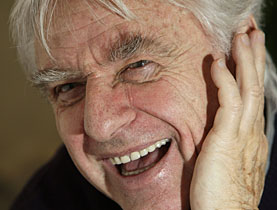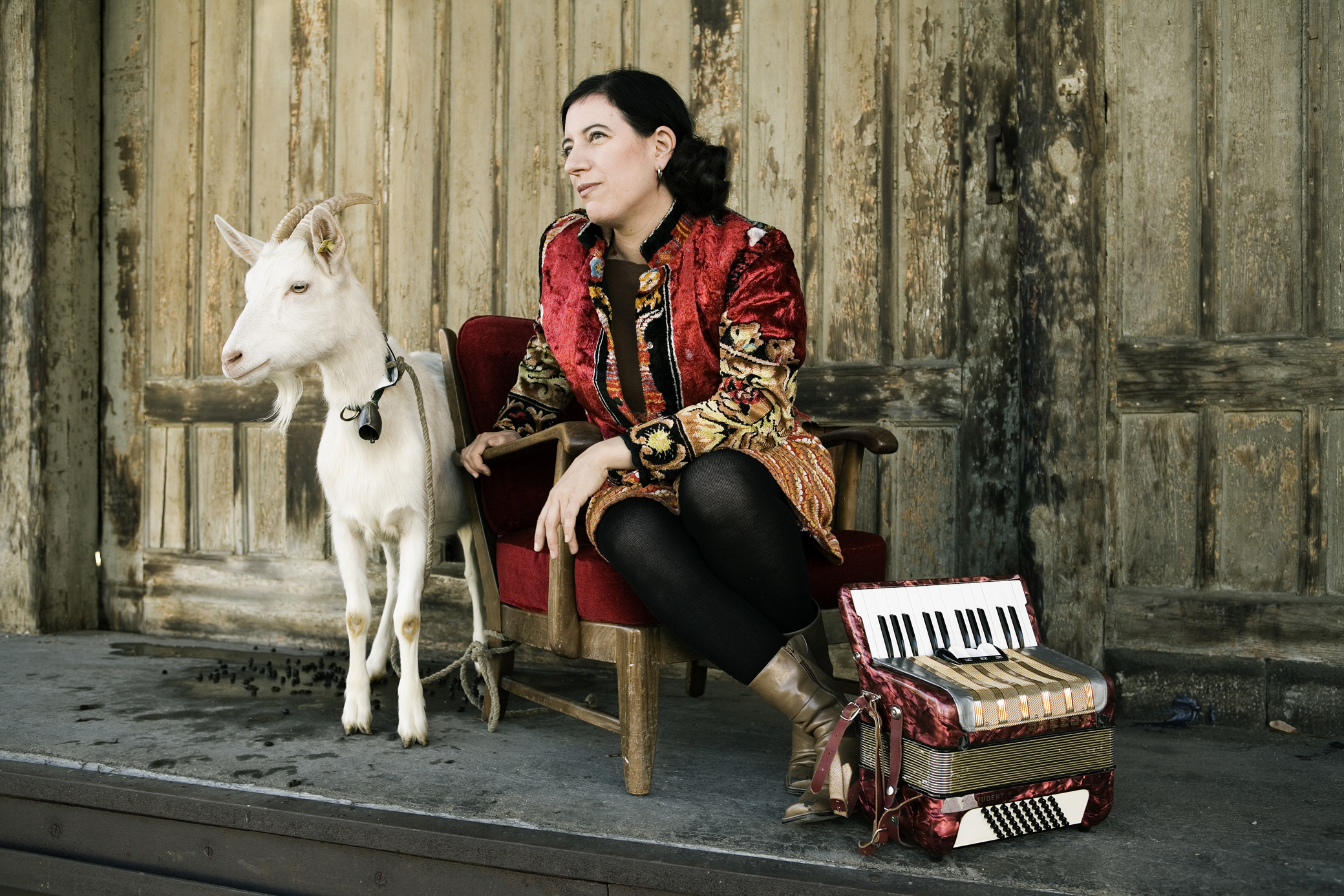Where a parking meter meets a polar bear

A singer who died nearly 40 years ago and who wrote in the Bernese dialect of Swiss German is celebrated in a new exhibition in the Swiss National Museum in Zurich.
Mani Matter might seem an obscure subject for outsiders, but his popularity endures throughout German-speaking Switzerland, and everyone – from schoolchildren to rock groups – still sings his songs.
He was not only a singer; he was a philosopher and wordsmith as well as a lawyer, academic and political activist. But is he really a historical figure who warrants an exhibition in one of Switzerland’s leading museums?
Matter “captured the essence of his time”, writes co-curator Pascale Meyer in the exhibition catalogue.
He was born in 1936, and came to maturity, and started singing, in the late 1950s, in what Meyer describes as the “transitional period from a society of scarcity to a society of excess”.
“He was a very critical spirit,” the exhibition’s second curator, Wilfried Meichtry, told swissinfo.ch. “As a young man he was very convinced by the Swiss democratic system, but as he got older, he found it wasn’t moving forward any more.”
The catalogue quotes some of Matter’s personal notes written in May 1968, when he was in Cambridge, working on his post-doctoral thesis. Some of the comments from his notebook at that time read as if they were written yesterday.
“Our small, wealthy country should have more important tasks than to defend banking secrecy and provide a tax haven for wealthy German industrialists,” was one.
Another was a call for an ethical economy, which – among other things – would prevent “the manufacture of items that can only find buyers thanks to a lot of advertising and artificially created needs”.
Lightheartedly serious
But although he was a man of deep seriousness, and reflects this seriousness in his songs, they are anything but ponderous.
“He was very critical of technological developments, seeing a risk that people would lose their intellectual capacities,” Meichtry told swissinfo. This really what underlies his song about the parking meter, he explained.
Its theme is: “I parked my car at a parking meter, but I didn’t have the right coin to feed it. I could have gone to the post office to change money, but I would have had to leave my car at the meter and I couldn’t do that because I hadn’t got the right coin – so in the end I just drove home again.”
Matter said in an interview shortly before his death in 1972 that his songs didn’t come so much from specific experiences, as from abstract ideas. But they are often given a very specific context, like a visit to the barber, where he is seized by angst seeing himself reflected to infinity in the mirrors and rushes out.
“So if you think I ought to go to the barber’s a bit more often, I’m sure you understand now why I hold back,” the song concludes.
Stealing back dialect
Matter’s influences were the French chansonniers – his very first public performance was an adaptation of a Georges Brassens song. He was also influenced by such musicians as Bob Dylan and Joan Baez.
But more than this, he was steeped in the German cabaret tradition, and his use of language is one of the things that made him so popular. He gave a wry twist to his native Bernese dialect.
“Until his songs dialect was something very old-fashioned,” Meichtry told swissinfo.ch.
“He developed a language, he brought a critical spirit into his songs, and you could say he stole the traditional song, which was part of a traditional, conservative attitude in Switzerland. He renewed it so that everyone suddenly liked dialect singing.”
Today, dialect rock is so firmly part of the Swiss music scene that it’s hard to believe what a change this was.
Keeping everyone happy
What Matter is known and loved for are his songs – but it’s quite a challenge to display “immaterial culture” in a museum. The museum has found a way to meet this which kills two birds with one stone.
Visitors are lent an iPad to take round the exhibition, which on the one hand enables them to listen to songs (and to interviews, and to watch films) at their leisure. Since the iPad is available in English, French and Italian as well as German, people quite unfamiliar with Matter can get a very good idea of what he was about.
But as Meyer explained to swissinfo.ch, the iPad is also a wonderful tool to settle the tug-of-war in all exhibitions between curators, who want to include as much as they possibly can, and designers, who want a clean, clear presentation.
“With the iPad you can read all the information sitting down, which is much more comfortable than standing up and reading it on the walls or show cases,” she said.
“We are trying it out for the first time, but we’ll use it for other exhibitions if people like it.”
So the iPad contains far more information than is on display, and the designer has been able – quite in the spirit of Mani Matter – to have fun.
There is naturally plenty of Matter memorabilia – including a practice guitar, a typewriter and the police ticket he got when fined 20 francs for taking the foot off the pedal when motorcycling.
But there are also reminders of his songs: a polar bear (which ate a would-be Eskimo musician, proving that art is always a risk), the tent of a love-sick Arab, a parking meter – and a barber’s chair in front of a set of infinitely reflecting mirrors.
Mani Matter – real name Hans-Peter – was born in 1936.
His father was a lawyer and his mother, who was Dutch, was a secretary.
The family language was French.
Matter was a keen member of the scouts, and wrote his first song for a scout event.
He studied law at the University of Bern, where he completed a PhD. In 1967-68 he spent a year at Cambridge working on a post-doctoral thesis.
In 1969 he took up the newly created post of legal consultant to the city of Bern. He also had a university teaching post.
He first appeared on radio in 1960, and started giving public performances in 1967, with friends in a group that became known as the Bernese Troubadours.
He started appearing solo in 1971.
He was politically active for much of his life, in particular with the Young Bern group, which wanted to break the mould of Swiss politics.
He married teacher Joy Doebeli – who provided many of the items in the exhibition – in 1963. The couple had three children.
Matter was killed in a road accident in 1972, on his way to a concert.
The Mani Matter exhibition is on at the National Museum in Zurich until September 18. It coincides with what would have been his 75th birthday.
Although he is little known in the French and Italian speaking parts of Switzerland, the iPad guide has been translated into both languages and into English.
The Zytglogge publishing house of Bern has reissued a number of recordings of Matter’s songs and his written works to mark the occasion.

In compliance with the JTI standards
More: SWI swissinfo.ch certified by the Journalism Trust Initiative





You can find an overview of ongoing debates with our journalists here. Please join us!
If you want to start a conversation about a topic raised in this article or want to report factual errors, email us at english@swissinfo.ch.